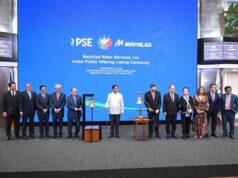Capital, equities markets to bounce back this year — FMIC

By Victor V. Saulon, Sub-editor
AFTER their dismal showing last year, First Metro Investment Corp. (FMIC) expects the capital and equities markets to significantly improve in 2019, as it forecasts stronger economic growth and lower interest rates.
“With a better economic outlook, and more favorable financial environment in 2019, we expect capital raising to recover from the 25% slump in 2018 to expand this year by 51% to P824 billion,” Jose Pacifico E. Marcelo, FMIC’s senior executive vice-president, said during the firm’s annual economic and capital markets briefing at the Grand Hyatt in Taguig City on Tuesday.
FMIC forecasts the gross domestic product (GDP) this year to expand by 6.8% to 7.2% amid a strong macroeconomic fundamentals. It expects economic growth to be driven by an upturn in consumer spending partly as a result of an improving inflation outlook. The mid-term elections in May are also expected to provide an added boost.
“Fixed income issues, down 46% in 2018, is expected to almost double to P618 billion due to the expected quadrupling of bank bonds,” Mr. Marcelo said.
“For the equities market, volume is expected to ease slightly from the record P207 billion and 61% growth in 2018 to decline to P206 billion in 2019,” he added.
Initial public offerings (IPOs), however, will pick up this year after the deferred issues last year, and could boost the volume to P62 billion from P8 billion previously, he said.
“One silver lining is that the year 2018 ended with a positive momentum, which has been carried over to this year, so far, giving us reason to be cautiously optimistic for a much better 2019,” Mr. Marcelo said.
Cristina S. Ulang, FMIC vice-president and research head, said the equities market is coming from a sharp drop last year, alongside other emerging markets.
“For this year our view is very constructive,” she said, citing the country’s “very positive” macroeconomic picture. “We believe that the Philippines is still one of the solid growth stories in Asia.”
Ms. Ulang said the positive expectations include a recovery in consumer spending, election spending, and the country’s sustained fiscal stimulus.
“The growth of government spending is big. It’s 45% in infrastructure year-to-date November. In terms of capital outlay it’s about 35% year-to-date growth,” she said.
“And our deficit is targeted this year at 3.2%, slightly higher than the 3% of last year based on the DBM (Department of Budget and Management) fiscal program this year. And our infrastructure spending is also a bit higher — 5% this year of GDP coming from 4.9% of last year,” she said.
A recovery in manufacturing and tourism is also seen this year.
Ms. Ulang said the return of the foreign funds would be critical to the sustainability of the Philippine Stock Exchange index’s (PSEi) uptrend. So far this year, the index was already up by 7.5% to 8,024 on Monday, with foreign buying at $127 million.
A number of developments could drive the market even higher, including the liquidity situation. She said that after the tightness in liquidity, the improvement in the inflation rates could result in a potential easing of the government’s benchmark reserve ratios and policy rate.
“All of these will contribute to the easing of the liquidity situation and any liquidity improvement is positive for the equities market,” Ms. Ulang said.
She noted the “much awaited” pause in the US Federal Reserve’s policy rate hike cycle as well as the Bangko Sentral ng Pilipinas “potentially pausing” its rate increases in the first half could augurs well for equities market.
“And if we are going to believe what Trump has been saying all over that he is in the midst of a fantastic trade deal, then it’s going to be an additional tailwind for the Philippine market,” she said.
Ms. Ulang said the risks this year include higher-than-expected Philippine budget deficit, slowing global economy, potential risk of a recession in the US, escalating global trade war, large yuan depreciation and some geopolitical events, including a Brexit crash and the spread of populism in Europe.



